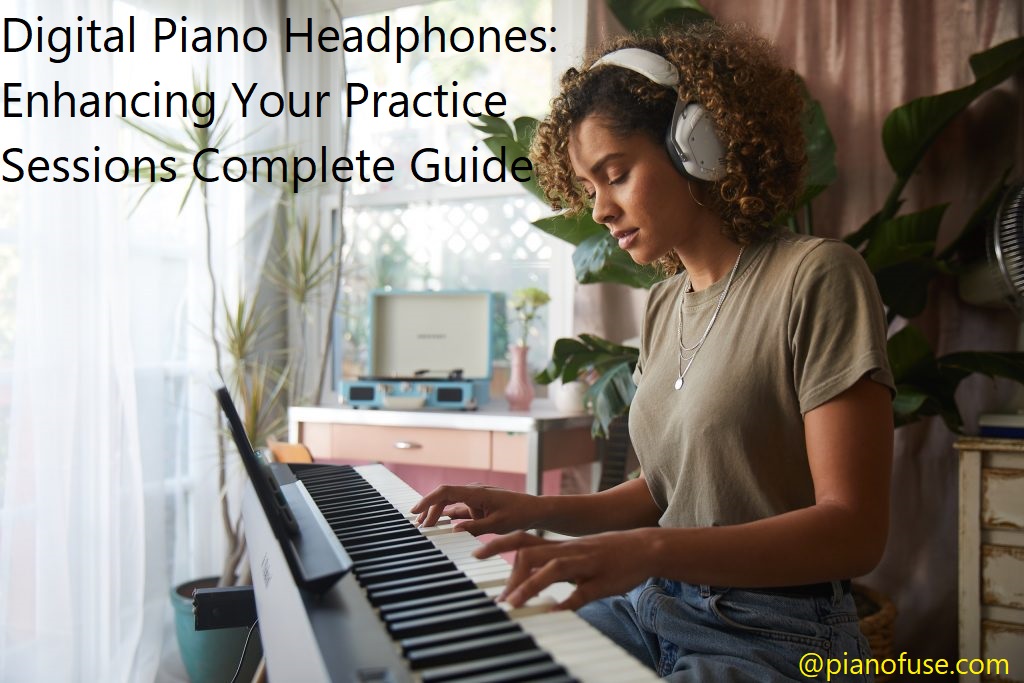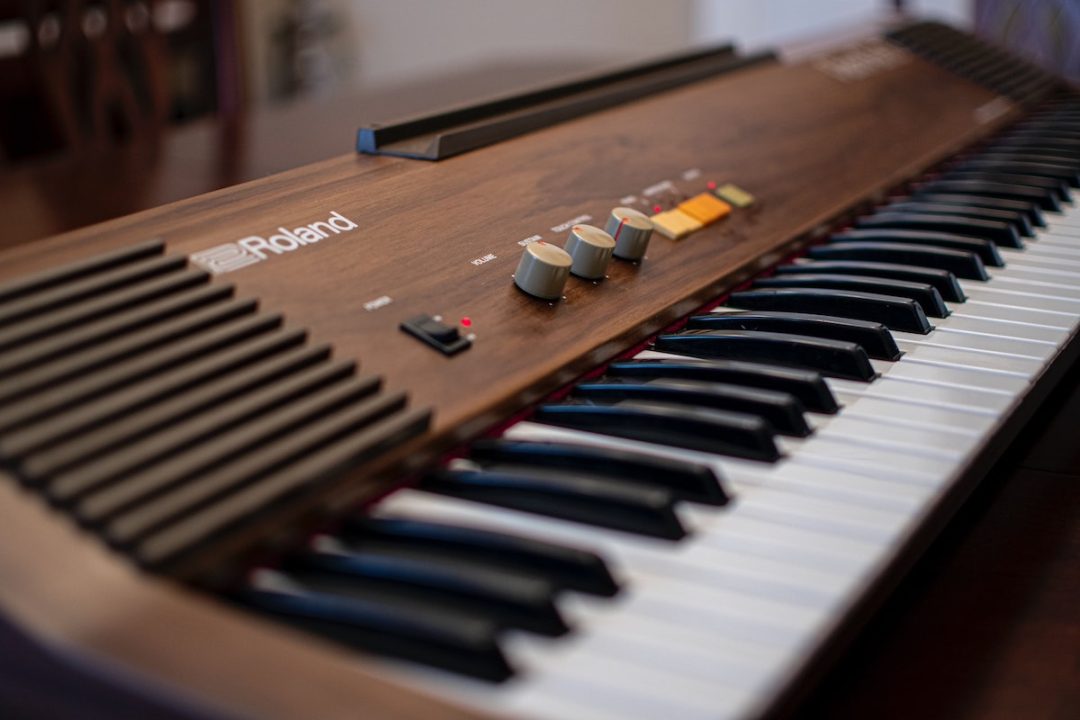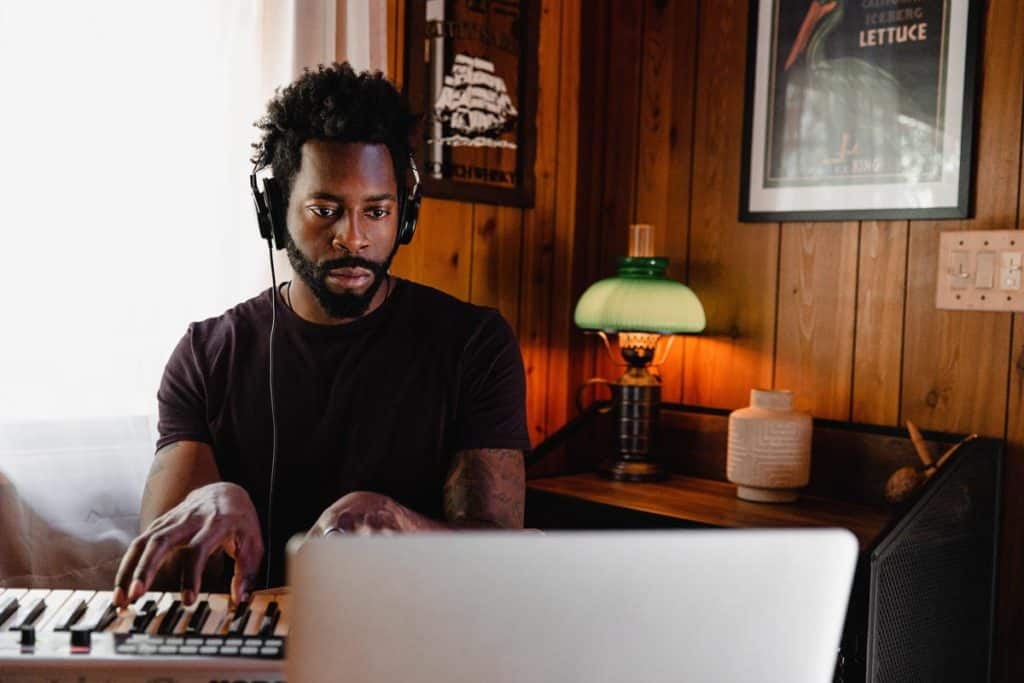Do you long to practice your digital piano, but are hindered by noise or space constraints? Discover how headphones designed for digital pianos may be the perfect solution to enhancing your piano playing experience!
You can enjoy uninterrupted practice sessions with these specialized headphones and get closer to achieving that perfect performance.
It is no secret that playing a digital piano with headphones comes with a range of exciting benefits, from the ability to practice without disturbing others to experiencing music in new, immersive ways. With the right pair of headphones and proper setup, you can enjoy all the advantages of an acoustic piano without any of its associated noise levels. Unfortunately, for many first-time buyers, finding the perfect pair may seem like a daunting task.
To make matters worse, most digital pianos do not come with user-friendly instructions to help make sense of available headphones. This guide is designed to help you learn more about how best to maximize your use of digital piano headphones and take your skillset even further.
We will break down everything you need to know— from why sound clarity is key in choosing headphones for your digital piano sessions to different types available on the market today — so that you can experience all that headphone practice has to offer!
Explanation of Digital Pianos and Headphones
Digital pianos and headphones allow you to practice piano in a very specific, focused way. Digital pianos, also known as electronic pianos, are incredibly versatile instruments that are designed to replicate a standard acoustic piano. However, they offer much more in terms of sound variety and recording capabilities than an acoustic instrument can provide.
Digital pianos usually have built-in speakers and amplifiers so that your music can be heard externally as well as internally in headphones. Depending on the brand and model of digital piano you own, it’s likely that it offers many different sound options. From popular grand piano sounds, to classical-style organs, to all types of drums, synthesizers, strings and more – digital instruments often offer a wide range of sound possibilities for musicians.
When using headphones with a digital instrument, it offers musicians the ability to practice without disturbing others who may live or work nearby – some models even have additional inputs for listening to external sources of music or audio playback while practicing. Very often this capability is contained within the unit itself without needing other devices connected between the instrument and the microphone or sound system you’re using for listening in headphones mode.

Importance of practicing with headphones
Practicing with headphones can make your practice sessions more productive, no matter what you are learning. This article will cover the advantages of incorporating headphones into your practice routine, as well as how to select the right pair for the job.
Practicing with headphones may seem daunting at first but it can be advantageous in many ways. For starters, listening to yourself without distraction can help you develop better intonation and technique by being able to analyze and focus on minute details. Furthermore, practicing with headphones will allow you to stay in time and make fewer mistakes since you won’t be competing with other sounds such as TVs or conversations that may overlap your playing time. Additionally, if you are playing digitally or acoustic piano-synth function, then using headphones is especially important since having sound come out through a speaker system could create audio feedback problems between the microphone and amplifier. Finally, using sound-blocking or noise-canceling headphones can facilitate good concentration in a collaborative practice environment by helping block any noise from outside of your personal space; this is perfect for students attending group classes or musicians practicing together.
Once you have decided that rehearsing with headphones is beneficial for your development musically, then selecting the correct kind would be the next step for optimizing sound quality and preventing any potential damage to your hearing health. Consider purchasing quality closed dynamic stereo studio cans like those made by Sennheiser or Beyerdynamic; these headsets offer both clarity of sound from digital pianos as well as outside noise isolation. Depending on personal preference and budget needs, there are also Bluetooth options available if one wishes to go wireless while practicing or working on projects at home still holding all same benefits discussed previously while being much more comfortable than corded versions.
Benefits of using digital piano headphones
Using digital piano headphones offers a range of benefits, both in terms of sound quality and convenience. Acoustic piano headphones can provide the necessary isolation from external sounds while still providing the clarity and tonal accuracy of a live performance. The cordless capability also makes them ideal for use with both hands-free practices and more traditional setups.
With noise-cancelling capabilities, they are great at blocking out strategies such as nearby conversations or traffic sounds that can distract from your practice session. Plus, with no ambient sound to interfere with your playing, you can achieve greater focus on your technique and better results overall!
Features to Consider When Choosing Headphones
When choosing headphones for use with digital keyboards and electric pianos, there are several essential features to consider. These include sound quality, comfort and fit, noise cancellation, and compatibility. Below we offer an in-depth look into what these features mean for you when selecting a pair of headphones for your practice sessions.
Sound Quality: The most important feature to consider is sound quality. Quality headphones will provide a clear, balanced tone and offer dynamic performance across a wide range of frequencies. To ensure they deliver the best results, look for headphones that include features such as noise cancellation technology or low-distortion drivers.
Comfort and Fit: Absolute comfort is critical when selecting head gear; it’s best to try the headphones on before committing to buy a pair. Headphones should fit snuggly but allow you to freely move your head without feeling any pressure on your ears or neck area. Ensure the earpads are stay in place during vigorous playing sessions too!
Noise Cancellation: If you’re going to be playing publicly—in loud environments—noise cancellation should be top of mind when choosing digital piano headphones. Look for low-noise designs that have built-in noise cancelled technology so you can practice without being distracted by outside sounds and background conversations.
Compatibility: Finally, make sure the headphones you choose are compatible with your keyboard or instrument —some models may require additional hardware or software depending on input type and connection port size, so check before purchasing!
Sound Quality
When it comes to sound quality, it is essential to consider all of the features that the headphones provide. Generally, the more money the headphones cost, the better sound quality they will have.
Good digital piano headphones come with excellent noise cancellation features, meaning you won’t have to worry about outside noises interfering with your practice sessions. Additionally, many higher quality headphones come with sound isolating features which prevent sounds from bleeding into other instruments in your practice space.
It is also important to consider factors such as frequency response and impedance when it comes to high-quality sound. Frequency response refers to the range of sounds that can be heard by a headphone set, while impedance is related to how much power a headphone can handle. A good rule of thumb is that if the headphones are capable of handling higher power levels then they will give out better sound performance in general.
Finally, make sure you check out reviews online and look for feedback from others who have used similar products before making your purchase decision.

Comfort
When buying digital piano headphones, it is important to ensure that you select headphones that provide a comfortable and secure fit. The best way to determine the comfortability of the headset is to try them on before purchase.
Look for headphones with soft padding on the earpieces, such as memory foam or gel. This will help reduce any discomfort from extended periods of use. Additionally, most digital piano headphones come with adjustable headbands and rotatable earcups so you can adjust them to your head shape and size for an even better fit and comfort.
Noise Isolation
Headphones with good noise isolation capabilities play an important role in creating an ideal practice space. Noise isolation allows you to focus more on the keyboard sounds, so you can hear any nuances that might otherwise be lost in the ambient noise of your environment. Along with digital pianos already featuring headphone jacks, many other digital keyboards and synthesizers may require special adapters to plug in headphones.
When choosing headphones, look for options that feature active noise cancelling technology. These headphones use a combination of sound technologies (such as microphones) using different frequency ranges to create a type of white noise that cancels out background noise. This type of technology works best when you’re practicing music isolate from external sound sources—such as cars passing by or people talking outside—without sacrificing the crispness and tonality of the piano sounds coming through your headphones.
Most brands offer various levels of noise isolation capability in their headsets. When selecting relevant products, take the time to read product reviews from other users and check out manufacturer specifications to see exactly how they compare on these features so that you can identify the right product for you. Additionally, some models have adjustable levels of bass and treble response, which also provides another layer of control over your sound quality when listening with headphones.
Durability
The longevity of your digital piano headphones is an important factor to consider when making a purchase. Since many practice sessions require extended wear, you want the headphones to stay in good condition throughout each session, and for a long time.
Find out the material of which the headphone is made, as well as what type of battery is employed. The standard advice is to buy higher quality headphones with higher quality battery efficiency so that they don’t need too frequent changing. Make sure to read customer reviews on websites that sell digital piano headphones, or even watch product reviews online, if available.
It’s also important to go for waterproof models with dust resistant cords if you’re looking for durability and extended use since sweat and dust can interfere with their performance and longevity over time.
Portability
When you want to practice digital piano away from home, portability becomes an important factor. There is a range of digital piano and keyboard models that feature a lightweight and collapsible design for easy transportation. However, if you are limited in space or don’t have the budget for a full-size model, then you can consider using headphones with your portable instrument. Not only will headphones allow you to practice without disturbing others, but they also enable more immersive experiences no matter where you are.
Headphones come in a variety of styles and designs, but ultimately the choice comes down to user preference and the sound quality that meets your needs. There are usually two types of headphones – open-back and closed back. Open-back headphones allow the sound to freely escape into the environment while closed backs trap sound within the ear piece which creates an airtight seal around your ears allowing for better isolation so that external sounds do not interrupt or compete with what’s playing through your headset.
Another important factor to consider is comfort as prolonged use of headphones may cause discomfort due to their weight or size – therefore always ensure that they fit securely yet comfortably over your head. Finally, depending on what type of device you own such as computers or mobile devices – make sure that you find a set of digital piano headphones compatible with it before making any purchase decisions.
Conclusion
In conclusion, headphones are a fantastic tool to take your digital piano practice sessions to the next level. Not only will you be able to reduce external noise and practice more efficiently, but you may discover that listening back to yourself helps you develop better technique and improve quickly.
It is also important to remember that good quality headphones can bring higher levels of enjoyment while playing and should be seen as an important part of your digital piano setup. By considering your requirements, budget and preferences carefully, you should now have a better idea of which headphones will work best for you.
See Also:
- Best piano mic 2023
- Best portable digital piano 2023
- Best portable piano keyboards 2023
- Best upright piano 2023
- Best yamaha digital piano 2023



